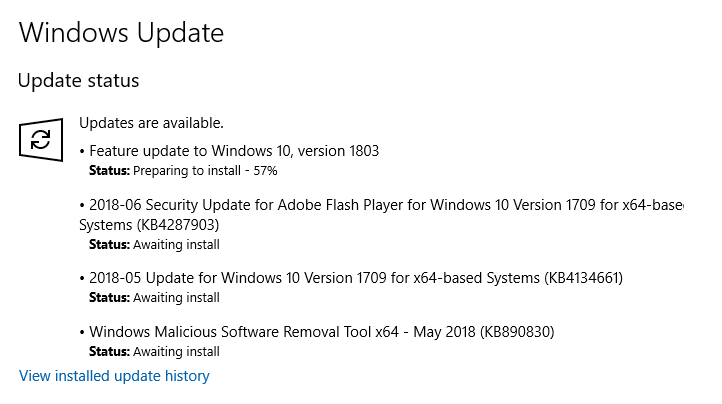Updated: January 18, 2019
Whenever I encounter the phrase "embrace the change" - online or in real life, my fingers begin to twitch with the onset of rage that I, as a rational being, am able to contain and put aside, and then write an article about, as I'm doing here. Because that phrase, especially when bundled with technology, has become the lazy excuse for sub-mediocre design of products and arbitrary choices (or rather, lack thereof) that define the world today.
So what is this all about? Well, if you happen to use a computer, which you obviously do, you must have noticed the deterioration of quality in software these past few years. Nothing new, plus see above. The "agile" mindset is what has transformed a reasonable practice (i.e. programming) into a beta-quality bugfest of hypes and buzzwords. That wouldn't be so bad and sad if not for the overly enthusiastic borg drones reciting the message all over the place: embrace the change, embrace the change. Welcome to Idiocracy, where newer is always better.

Note: Courtesy of Freeimages.com/skarlyt.
Evolution
Technology is an extension of life. Life is governed by optimization - increasing the chances of survival. If you can make your system (whatever it is) use less energy, then it is evolutionary superior to other models, hence its improved odds of survival. As true for Neanderthals as it is for computer chips.
Life is all about trial and error - endless permutations of change being tested up and down the energy tree until you find a stable spot (a valley of reduced energy) where you can maintain and sustain the existence of a successful toss of the dice. Humans have played this game alongside every other species on the planet for countless generations. It comes out in every shape and form and action we do.
Just think about personality types. Why are there people who are willing to sail into the offing, searching for new continents? Or go climbing up the Himalayas? Or stick a flag on an arctic pole (when not submerged)? The answer is rather simple. Biologically, we need adventurers as much as we need domestic types, yesmen, leaders, followers, smart and stupid, because they all represent important aspects of the evolutionary model that makes humanity more efficient and robust in the long run.

Sir Francis Drake, the very first VC-funded modern startup.
Now, technology ...
Ideally, every tool we make ought to ... make our lives better. And on average, this has been true, and will pretty much remain so for as long as the humanity exists. But that's only because we selectively judge our progress. Technology ideas and products come and go, and most die, and only the best ones survive. No one remembers the losers, only the winners. However, there's a problem.
What happens when you develop tools that do not necessarily align with the survival model?
You end up with things that are, for the lack of better word, utter crap.
And they can continue existing because they don't threaten the survival.
Between social media and plague
Imagine a dire situation. Something really bad. Like zombies, only actually possible. World war, massive epidemics, take your pick. Whenever mega-disasters strike, people quickly abandon philosophical activities and focus on sheer, raw survival, which is also why most dystopian books and movies depict their societies as brutal and elemental. That's a cliche, but that's also the reality; history books are full of interesting examples.
In the sheltered, blissful first world, where there are no existential problems any longer, the society has reached a point best described as decadence. It's a good thing. People can indulge in higher forms of entertainment and education, for the sake of it, without having to constantly fight the daily battle of survival. This allows for a much wider margin of error than the evolution would suffer otherwise.

The man is sad, because someone didn't like their social media post.
Note: Courtesy Freeimages.com/Thomaz Scalquo Cia.
This allows companies to develop and sell products that serve no higher purpose than to milk silver off idiots and their petty hobbies. This allows companies to bleed the quality of their products, because they can get away with it. This allows them to use hypes to justify arbitrary decisions and call them innovation.
This also allows people to spew nonsense, like the phrase: embrace the change.
Mass usage ruins things
Think air travel before low cost. Think classical music. Think any technology or product in its early days, before regulation, before massive commercialization. The sweet spot between beta quality and the moment someone figures there's a new cash cow out there that can be squeezed dry.
This was the Internet for a while, but then the agile meteor hit. This also coincides nicely with the rise of the mobile phone and then the smartphone and then the social media, which allowed every random mouth breather to become an equal voice in the worldwide forum of verbal diarrhea called the web.
So what happens when companies design products for idiots? You end up with idiotic products. What happens when companies "optimize" everything for mobile? You end up with desktop solutions that looks like toys for people with unpaired chromosomes. And what happens when you let everyone have access to the Internet? They keep telling you how change is good, oh so good, a religion of good.
Examples, Examples, Capitiane!
Of course, just idly ranting is not enough. I need to give you real examples, don't I?
WebExtensions
How do they make browsers better than before? They don't. Less functionality. Le fail.
Reader mode in browsers (or whatever it's called)
You get a "stripped down" page so that you don't get "distracted" reading. Rather than solve the issue of Javascript-drenched, hyperactive sites serving stupid content to stupid people, you get a simplified view of the content. Instead, why not develop pages that are quiet, non-intrusive and non-distracting? Where would that get us? That's right, back to the early Web, before someone figured that Javascript plus maybe an ad or two equals a new generation of Web, AKA 2.0. Ah.

For that matter, why not just use reader mode as the default for all sites?
WordPress
My writing blog happens to be powered by WordPress. It was a deliberate choice I made years ago, and so far, I've been more than happy. After all, this is a really nice platform. Or it used to be until Gutenberg was released. A mobile-optimized solution for web development. Yup.
And so you have a product that takes many more clicks to realize what the old interface did with just one. Plus, it's more cumbersome, and slower, and still can't do some of the things the predecessor could. That's not progress, is it. More energy = evolutionary penalty.
I also got a chance to use Gutenberg more extensively. Not just testing, don't ask how or where, but I was actually forced to work with this new interface. I timed my productivity, and came up with a factor of 3X penalty in time. A typical article prep session, where you sort things out before you publish the content takes 45 minutes now. Used to take 15 minutes.

In my review, I mentioned mouse clicks, but it's even worse. If you copy & paste text from Gutenberg to a text editor (if you want to do pre-formatting or wrap text so it fits into one paragraph), you end up with these WordPress comments all over the place. If you want to change the block type, you need to go up to the top of the block to click on the icon to change it, so you're wasting life scrolling up and down. And it's so much slower than the old interface. You can feel the lag in mouse clicks actions.
BTW, when I wrote the article, Gutenberg had the score of 2.3/5.0 with 1,200 reviews. Now, it's down to 2.1/5.0 with 3,700 reviews. Classic Editor has almost a perfect score and more than 2 million downloads - used to be one tenth of that just a few months ago. Let that sink.
Touch
What does an average phone user look like - a chimp focusing hard on some peanuts. You're squinting at a tiny device in your hand, head bent down, you're typing slower than I can piss patterns in the snow, and every action takes a dozen taps. That's what happens when you collapse productivity, and this is why Windows 8 was not a good product, and why the whole desktop-going-away stupidity was just that.
And here, we have a good example of where evolution beats regression. People actually needed to use their desktop (a modern feature that has become an inseparable part of our basic basket of needs), and so they rejected the experiment. There are tiny moments of hope here and there.
Windows 10 updates
Slower than XP/7/8 - by a big margin. Less stable, too. You've all read the news - and the casual 'break it till you make it' approach is also starting to affect the older versions of the operating system now as well. But this is what happens when you embrace the ADHD mode of work and release software twice a year like some overzealous college student. Microsoft's updates used to be the stuff of legends, rock-solid and stable.

Google Chrome UI
Mobile stuff ruining the desktop again. I've shown you this in my guide for Chrome 69, alas, this no longer works in recent version of the browser. Age 21 fonts, an interface that is designed for young people, developers no less from the look of it, and completely ignores the need of the population that actually works and pays taxes, i.e. the old folks and whatnot. Gray on gray is not progress.

BTW, my once beloved Firefox falls into a similar category - Australis and then back to normal. Well.
Linux and friends
You'd think the world of open-source would escape this cheap reduction of human intellect. But no. The world's saddest violin is playing mightily loudly in the halls of Tux, too. Linux distributions are, by far and large, less stable, less ergonomic and less capable than they were five or six years ago. Lots of activity, few results.
And when you do get results, they are made by devs for devs, object-oriented software solutions that intrude into the user space and complicate things without any benefits. Systemd is a good example. Wayland is another. Network tools yet another. Then, we also have the flattification of UI elements, the same kind of stuff that Google's been doing. And everyone is doing it, because hey, if Google does it, then if they imitate Google, they will be like Google, right. None of these things help, but we can tolerate them because they don't really make any difference in the overall story of human survival.

And then, the Internet is getting smaller
When the utterly brilliant Mike Judge produced his horror documentary Idiocracy back in 2006, he created a scary dystopian forecast of the future, about a bleak, dumb world where entertainment can be summed up with the word ass and people are using big-button touch interfaces to communicate with the world using a limited IQ70 vocabulary. All this side by side with energy drinks and gladiator-like reality TV. The narrative takes place in Year 2500, and this is the one piece that Mike Judge got wrong. He was off by a few centuries. We are already entering the Schwartzschild radius of the black hole called stupidity.
Back in early 2000s, spyware was considered a bad thing. It was one of the primary forms of undesired software that could land on your machine, and much effort was invested in countering the phenomenon. Even desktop assistants were heavily frowned upon (oh the irony). Fast forward a decade or so, the concept of tracking and profiling has become inseparable from ordinary use, especially on mobile devices. The sad part? It's all legal, and people are going with it, both because they are clueless, and also because they will do anything for another social media like, as a compensation for all the love they were not given in childhood.
Who needs toolbars when the operating system keeps track of what you're doing eh? But it gets better. You also have limited control over ads, limited control over customization, apps run in the background, and various vectors of your personal data (with you volunteering like a chump) are uploaded into these buzzworldly mechanisms where it's processed, analyzed and then passed on to a third-party reseller like a used sock. In turn, you get advertisement, tailored to your "special" (IQ70) needs, a proof that deep learning has a long way to go, because at the moment, there's nothing magical or special in how "the cloud" computes second-order logic. It's laughable. Turing forbid you speak foreignese. That's a no-no.
Search engines, another interesting phenomenon, side by side with the explosion of data thanks to all these new vectors of data that people are giving away. If you've used search engines in the past decade or so, you will probably have noticed that it is harder to find content. For instance, searching using the exact URL. Or searching specific sources. Far less accurate and relevant than before. More data, less info.
I guess part of the change is the explosion of the mobile world. One, it makes sense for the search engines to direct traffic to mobile sources, as this is a very lucrative, profitable pie. Two, people consume content in a different way on the mobile. They don't really search. If anything, they search for applications in applications stores, which then serve and offer a very limited set of functionality. But this actually translates into about 10-20 commonly used applications. The actual hunt after information is gone. You consume feeds of nonsense provided by some of these glorified, encapsulated Web pages, you watch videos, and that's about it.
But that means, when you do actually want to search for stuff, the results will be less relevant and accurate than what they used to be. You will still find things, and if you're persistent and patient, you might actually end up with most of what you need. But it is more difficult. Technically, there's more data but less content. There are more indexed pages but fewer distinct sources.

An Internet user trying to find some good info out there.
This trend isn't new. This is like analog versus digital radio. Analog versus digital TV. The dominance of powerful, centralized entities that buy out or trample competition, becoming de-facto rulers of their domains, providing curated content in a very restricted, limited way.
Take any streaming service as an example. They can be quite fun, and I use some of them. But still, you can only do as much as their interface allows, and the search catalog is limited. Then, you get sponsored messages, promos, ads. Some of the streaming apps tend to crash a lot. By and large, this is, supposedly, progress over how people used to consume TV in the dark ages. But in the end, you still get to watch movies and series, in a slightly different package than in the past, and with less stability than your old dumb box and its umbilical wall cord.
Back in 2002, on the wild Internet of yore, one could watch any movie they wanted, no matter how foreign. Maybe it wasn't all by the book, but it was doable. Today, there's still no by-the-book streaming service that does the old trick quite as well. Sadly, most people are absolutely fine with this.
Now, if we extrapolate, fifty years down the road, there will not really be a great need for an independent Internet. As smaller sources, deemed less significant by the big companies, often for the wrong reasons, become less visible, they will eventually vanish. People will flock to the big guys, with the expectation that it's the only way to promote content. This is already happening with mobile app stores. This is already happening with digital books. You have lots of options but little choice. If you want to be seen out there, you are fighting heavy algorithmic odds. Top this with benevolent censorship, and that's it. The gilt cage is complete.
Embrace the change, they say.
So what should we do?
Well, it's simple. Every change ought to be measured against the primary function or purpose it's meant to serve. You ask, does the proposed change actually allow the tool you're using to be better, smarter, faster, more efficient, and does it improve your chances on an evolutionary scale? Yes, good. No, crap.
And if the change is bad, fight it. Because if you don't fight it, you're tacitly approving of stupidity and nonsense. If you don't stand up and fight these pointless hypes, then you are every bit as responsible as the companies churning out the sub-par solutions. In fact, even more so.
Say no to bullshit.
But when there's risk to life ...
On the other hand, there are technologies that remain good, despite progress - or actually thanks to it. In areas of life where there is a higher chance of injury or death, there's none of this recycled agile nonsense. Yes, companies play their office turd games, but the products themselves are not affected.
Cars, for instance. Safety has actually led to cars becoming better and smarter and more efficient. Healthcare is another good example. Nuclear reactors, check. Air travel - well, this is a tricky one. Inside the cabin, they are doing everything to pack more people in, cheapen the whole sardine experience and drive profits. But on the outside, the metal bits what make the big bird fly, we're only getting better and more efficient, too. So not all is lost yet.
Conclusion
Don't embrace the change. Evaluate the change. Judge it. Be strict. Because we've come too far as a race to allow stupidity to become the driving factor. That's an insult to the billions of humans who have died to mosquitoes and common flu and famine so that we could reach an evolutionary point where people accept low-quality, low-efficiency nonsense into their lives, and then sermonize about that with the obtuse optimism of religiously passionate fanboys.
But there's a happy side to this story, too. Not that long ago, I wouldn't contemplate rejecting the "modern" technology that much or that often. There was almost a thought of discomfort at such a move. But now? It does not seem so bad. Having gone through a few cycles of big tech changes, I don't see anything special or revolutionary in the Peckham water that companies are dishing out to the masses. It's an almost liberating thought, sprinkled with illumination, epiphany and other long words. Perhaps I should thank the agile crowds for this unintentional contribution of disdain and apathy. Good stuff, I'd say. Be if you're still out there, wondering if you can change the world, start by small things. Say no to stupid things. Don't embrace the change, embrace critical thinking.
Cheers.